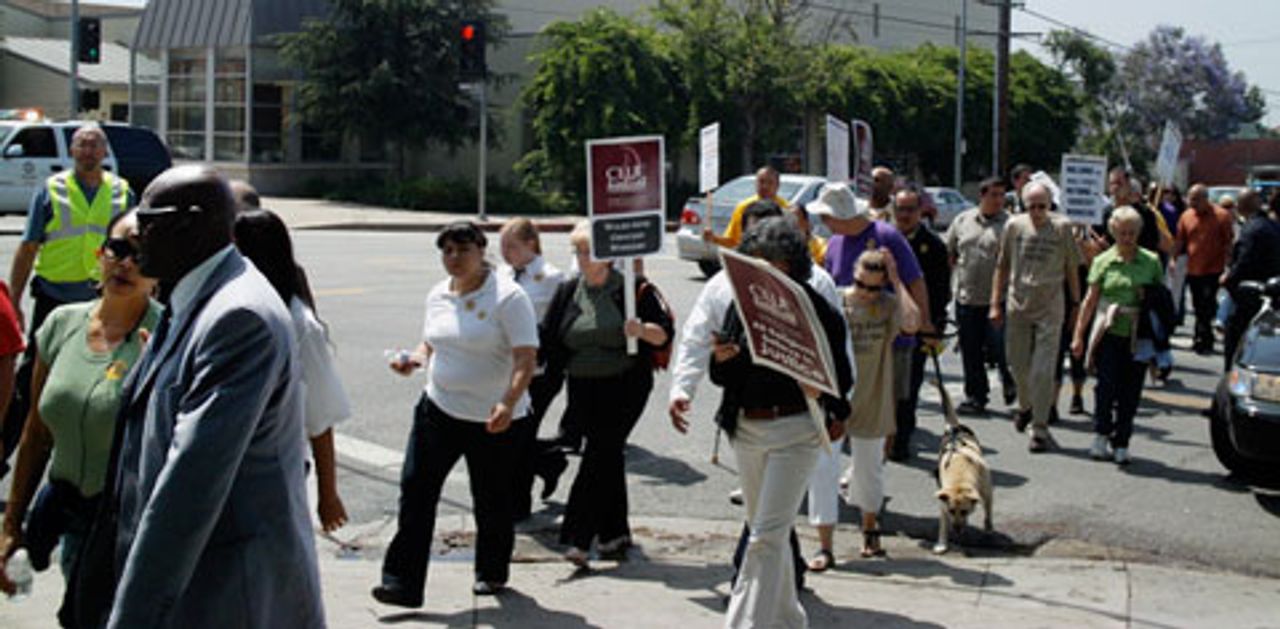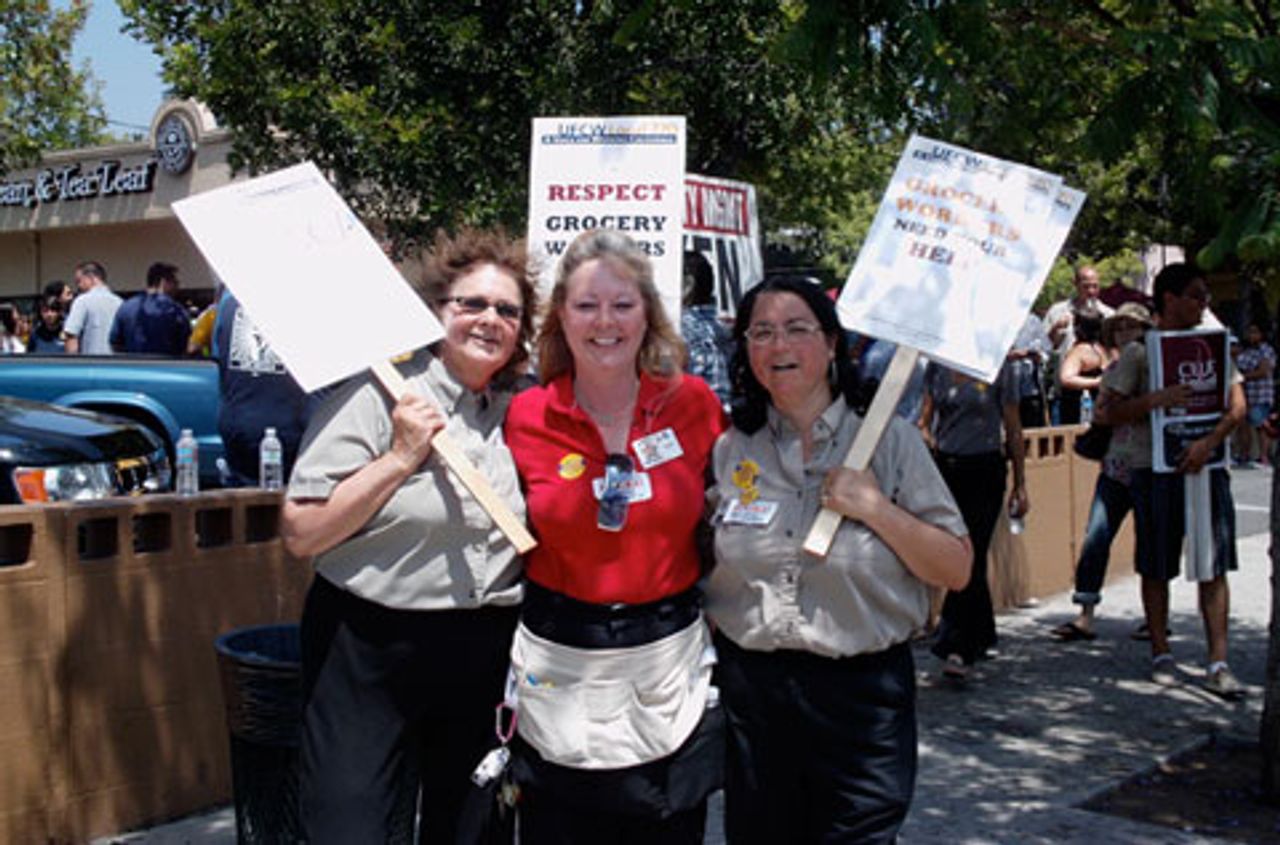 Grocery worker march
Grocery worker marchHundreds of grocery workers and supporters rallied in front of a Von’s supermarket in Los Angeles last week. The event was called by the United Food and Commercial Workers over stalled contract negotiations with the supermarket chains Ralph’s, Vons and Albertsons.
In April, over 62,000 grocery workers voted for strike authorization in view of the continued intransigence of the corporations. The UFCW opposed this vote of the workers and has made clear that it is unwilling to lead any struggle. Union officials have repeatedly professed unwillingness to “inconvenience the public” and antagonize management with a strike. Local 770 president Rick Icaza has asserted in interviews that “I thought those days were over,” and “We absolutely do not want to strike.” (See, “Southern California grocery workers authorize strike”)
The declaration featured on the UFCW local 770 web site well illustrates the opposition that the bureaucracy has toward serious industrial action: the unwieldy and less-than-ringing, “I don’t want to strike, but I will if I have to.”
The current impasse recalls the strike/lockout of 2004, when the UFCW leadership, in the face of strong worker determination and militancy, undermined and isolated the strikers. After 19 weeks on strike, the workers first rejected and then ultimately accepted a concessions contract supported by the union executives. The three-year agreement instituted a two-tier wage system, cut medical coverage and pensions and increased employee contributions. (See, “Union surrenders benefits, wages in sellout of California grocery strike”)
The contract was hailed as a victory and a job saver by the UFCW. Within weeks, Ralphs announced the closure of 15 stores, eventually eliminating 600 jobs.
The next contract, agreed to in 2007, included a paltry increase in pay, a modest shortening of the waiting period for healthcare eligibility and a supposed end to the two-tier system. However, the former second-tier workers had to—and still must—wait longer for health coverage and raises than first-tier workers.
This time around, the chains are demanding further givebacks in healthcare and retirement. According to the Los Angeles Times article, “the new payments could be as high as 50% of workers’ take-home pay, the union said.”
The World Socialist Web Site spoke to some of the workers at the rally. All three are veterans of the five-month 2004 strike/lockout.
 Diane, Candy and Emma
Diane, Candy and EmmaEmma is a scanning coordinator and shop steward at a Vons supermarket.
“We’re trying to at least have them contribute enough to maintain our pension. As it is, the last contract, when we were out for five months, whacked away at our pension. And so it means you have to either work longer or you take a really big cut in your pension. And also the medical, health and welfare. They’re shifting a lot of the costs to us, which is understandable to a certain degree. The two-tier employees that come to work now, they only work 24 hours a week! How are they going to be able to afford increased medical costs?
“It seems like they’re destroying the middle class. The working people, we live paycheck to paycheck. And I’ve been 27 years with Vons now, and I’ve always looked forward to my pension and my good paycheck. And now, it’s not enough.”
Candy explained, “There’s $23 a week health care cost for families, and $9 for just a single, like me. That’s not including going to a doctor’s office and paying a co-pay on top of all that. The second tier won’t get full-time benefits. It took me over 17 years to get full-time—I’ve been at the market for 22 years. I worked my butt off for this grocery store that I work for.
“It’s crazy out there, corporations, corporate greed, you know they’re trying to get richer and we’re just trying to make a living. I don’t have any kids or a husband or anything, but those kids that come in from here on out, you know, get married, have kids, they’re going to have nothing!”
“Right now if you don’t get 24 hours a week, you don’t get any insurance, nothing. If you work less than that, you don’t get anything. You don’t get your insurance for 18 months.”
“I’m in PIC [price integrity coordination], and they want to give my job to a GM clerk [a lower-paid classification]. If they do that, I have to go back to being a GM or a cashier. I can’t go back to that.
“We’re here for ourselves and the new generation coming into the grocery stores. We’re fighting for them as well.”
Diane works in the bakery at a Vons in Santa Barbara. “The second tier, I feel sorry for them because they work just as hard as we do, and they will never make the top pay that we do.”
“We’re trying to get back our retirement which they took away. We’re trying to get back our health. The grocery store 15 years ago was the place to work because they had the best benefits.
“Now we can’t do anything; it’s paycheck to paycheck. They took away so much, and we’re just going to be back to where we were with our rights and our retirement, our pensions.”
Subscribe to the IWA-RFC Newsletter
Get email updates on workers’ struggles and a global perspective from the International Workers Alliance of Rank-and-File Committees.
